北师大版(2019) 必修 第三册 Unit 8 Green living Grammar课件(共40张PPT)
文档属性
| 名称 | 北师大版(2019) 必修 第三册 Unit 8 Green living Grammar课件(共40张PPT) | 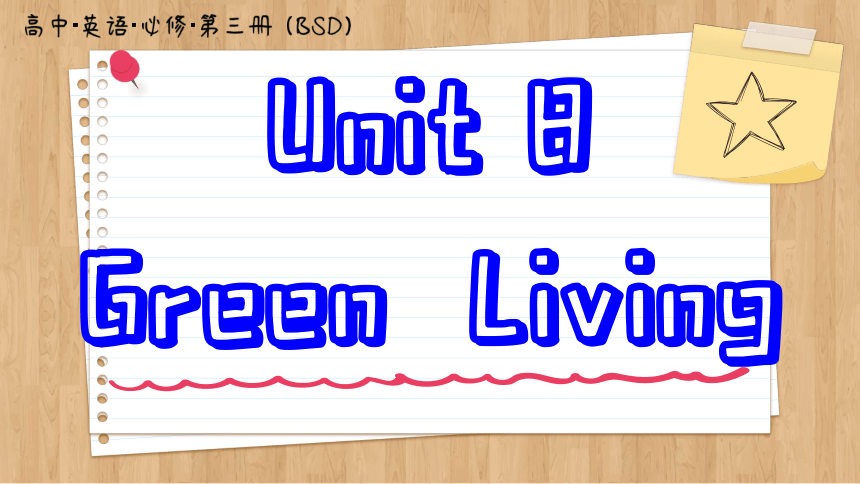 | |
| 格式 | pptx | ||
| 文件大小 | 59.4MB | ||
| 资源类型 | 教案 | ||
| 版本资源 | 北师大版(2019) | ||
| 科目 | 英语 | ||
| 更新时间 | 2024-04-17 16:04:25 | ||
图片预览

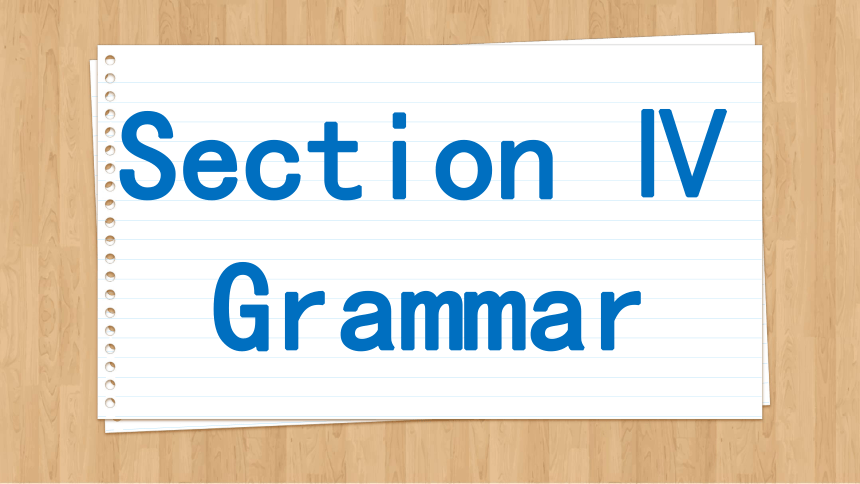
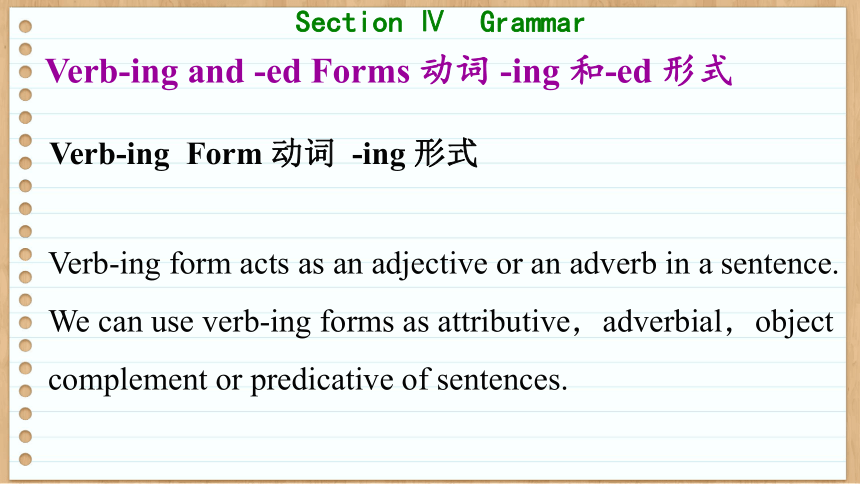
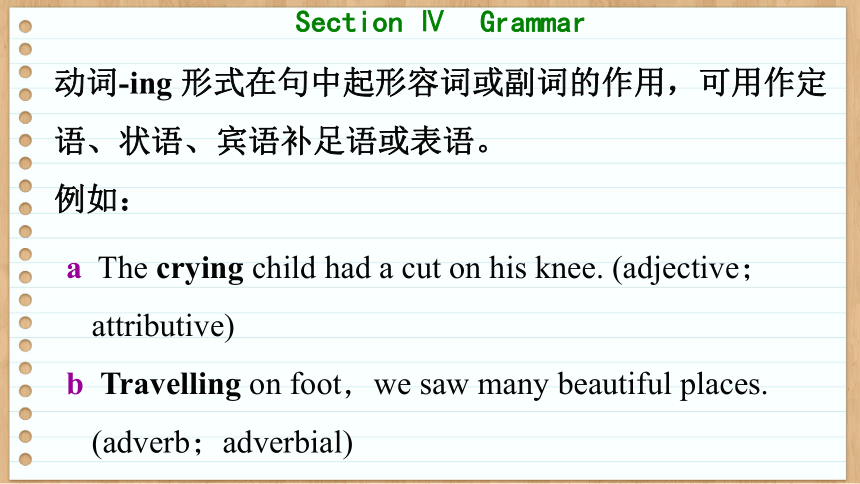
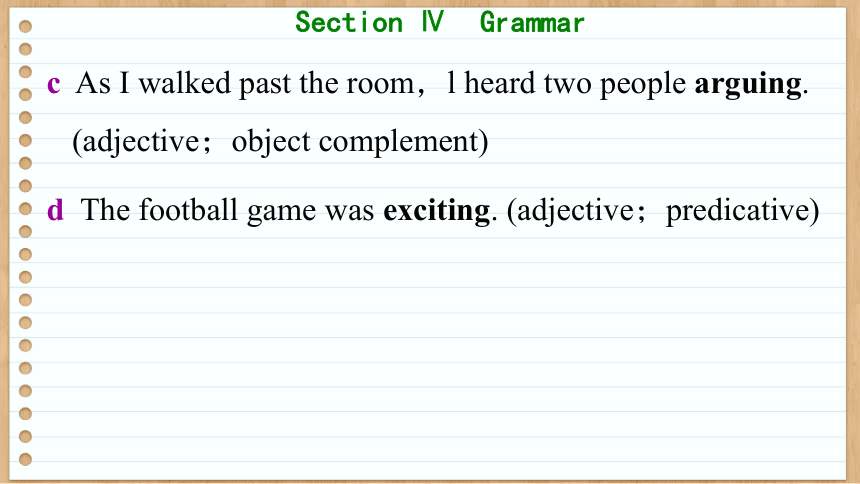
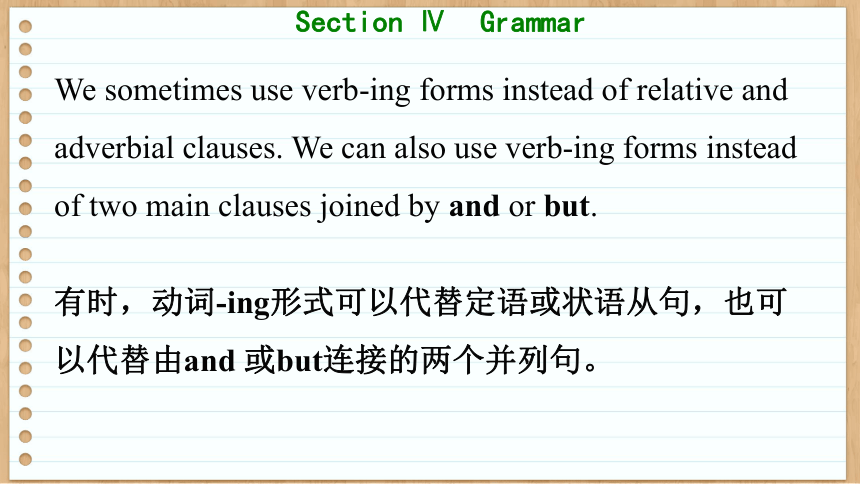
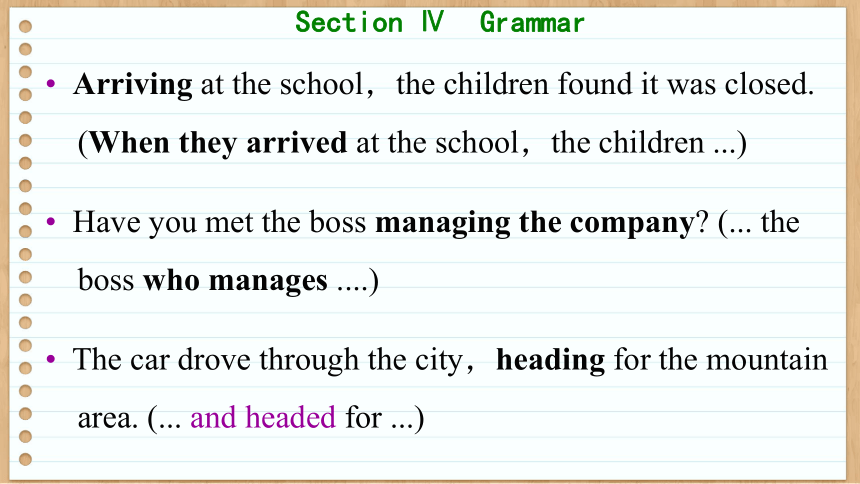
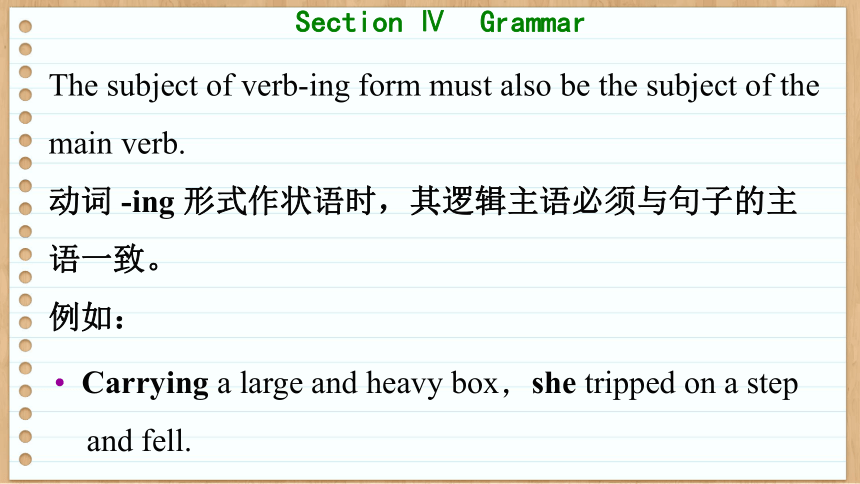

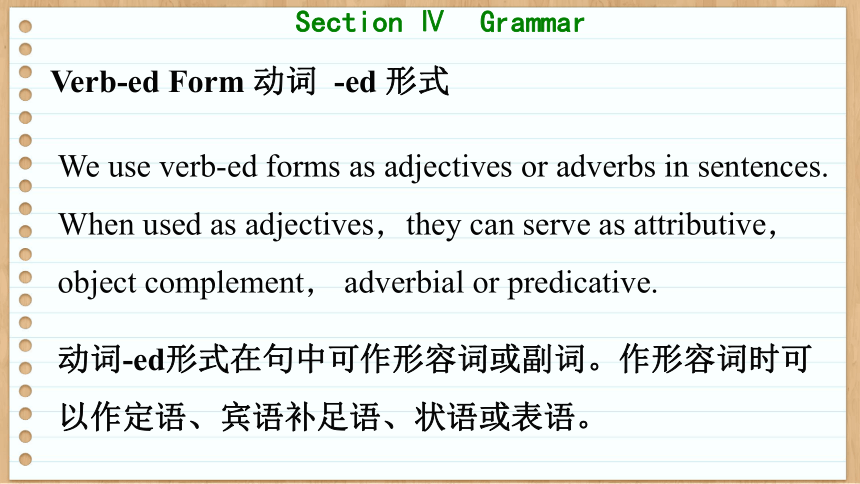
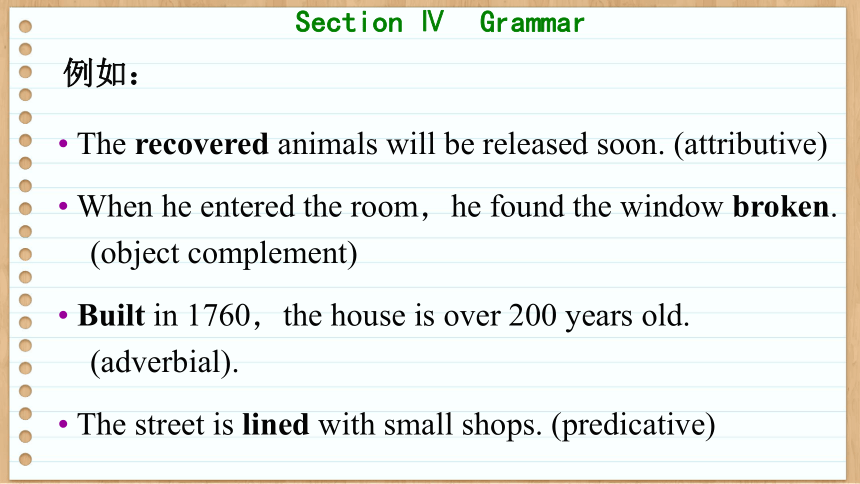

文档简介
(共40张PPT)
Unit 8
Green Living
Section Ⅳ Grammar
Verb-ing and -ed Forms 动词 -ing 和-ed 形式
Verb-ing Form 动词 -ing 形式
Verb-ing form acts as an adjective or an adverb in a sentence. We can use verb-ing forms as attributive,adverbial,object complement or predicative of sentences.
a The crying child had a cut on his knee. (adjective; attributive)
b Travelling on foot,we saw many beautiful places. (adverb;adverbial)
动词-ing 形式在句中起形容词或副词的作用,可用作定语、状语、宾语补足语或表语。
例如:
c As I walked past the room,l heard two people arguing. (adjective;object complement)
d The football game was exciting. (adjective;predicative)
We sometimes use verb-ing forms instead of relative and adverbial clauses. We can also use verb-ing forms instead of two main clauses joined by and or but.
有时,动词-ing形式可以代替定语或状语从句,也可以代替由and 或but连接的两个并列句。
Arriving at the school,the children found it was closed. (When they arrived at the school,the children ...)
Have you met the boss managing the company (... the boss who manages ....)
The car drove through the city,heading for the mountain area. (... and headed for ...)
The subject of verb-ing form must also be the subject of the main verb.
动词 -ing 形式作状语时,其逻辑主语必须与句子的主语一致。
例如:
Carrying a large and heavy box,she tripped on a step and fell.
The following sentence is not correct.
下面这个句子是错误的。
Carrying a large and heavy box, her foot tripped on a step and fell.
Verb-ed Form 动词 -ed 形式
We use verb-ed forms as adjectives or adverbs in sentences. When used as adjectives,they can serve as attributive,object complement, adverbial or predicative.
动词-ed形式在句中可作形容词或副词。作形容词时可以作定语、宾语补足语、状语或表语。
例如:
The recovered animals will be released soon. (attributive)
When he entered the room,he found the window broken. (object complement)
Built in 1760,the house is over 200 years old. (adverbial).
The street is lined with small shops. (predicative)
语法感知
指出下列句子中画线部分所作的句子成分
1. I didn′t know the girl giving a speech on the stage.
2. The girl likes reading the novels written by Mo Yan.
后置定语
后置定语
3. The two women sat on the bench,talking happily.
4. Attracted by the big monkey,the little boy refused to leave.
5. While playing football,he got his left leg injured.
伴随状语
原因状语
宾语补足语
语法探究
知识脉络
语法精讲
一、动词 -ing 形式
动词 -ing 形式在句中起形容词或副词的作用,可以用作定语、状语、宾语补足语或表语。
1. 作定语
①前置定语
The crying child had a cut on his knee.
那个正在哭的孩子膝盖上有一个伤口。
②后置定语
There are many boys playing football on the playground.
有很多男孩正在操场上踢足球。
2. 作状语
①方式或伴随状语
The children walked out of the classroom,talking happily.
孩子们走出了教室,高兴地交谈着。
②时间状语
Seeing the woman,the lovely baby stopped crying.
看到这个女人,这个可爱的婴儿不哭了。
③ 原因状语
Not knowing her address,I couldn′t send her the package.
因为不知道她的地址,我无法给她送包裹。
④条件状语
Working hard,you will achieve your goal some day.
努力工作,你就会在将来的某一天实现你的目标。
⑤结果状语
The strong wind blew away good soil,leaving only sand.
大风吹走了好土,只剩下沙子。
3. 作宾语补足语
Eg. As I walked past the room,I heard two people arguing.
我路过房间时,听到两个人在争吵。
The girl is shy and it is hard to get her talking.
这个女孩很害羞,让她开口说话很难。
4. 作表语
Eg. The news is encouraging.
这则消息令人鼓舞。
You young people are fascinating.
你们这些年轻人非常可爱。
5. 注意问题
①有时,动词-ing形式可以代替定语或状语从句,也可以代替由and或but连接的两个并列句。
Arriving at the school,the children found it was closed.
=When they arrived at the school,the children found it was closed.
Have you met the boss managing the company
=Have you met the boss who manages the company
The car ran through the city,heading for the mountain area.
=The car ran through the city and headed for the mountain area.
②动词-ing形式作状语时,其逻辑主语必须与句子的主语一致。
Carrying a large and heavy box,she tripped on a step and fell.(√)
Carrying a large and heavy box,her foot tripped on a step and fell.(×)
【即学即用】
翻译句子
①她冲着正在爬树的男孩大喊。
②他在派对上说的话确实让人惊讶。
She is shouting at the boy climbing the tree.
What he said at the party was really surprising.
③这两个男孩站在那里,怒视着对方。
④看到这些快乐的孩子,这个人对生活很是满足。
⑤导游站在那里,解释那幅古画。
The two boys stood there,staring at each other.
Seeing the happy children,the man was content with his life.
The guide stood there,explaining the old painting.
二、动词-ed形式
动词 -ed 形式 (过去分词) 在句中可作形容词或副词。作形容词时可以作定语、宾语补足语、表语或状语。
1. 作定语
① 前置定语
When he walked into the yard,he saw the fallen leaves on the ground.
他走进院子时,看到了满地的落叶。
The volunteers pay a regular visit to the retired teachers.
这些志愿者定期去看望那些退休的老教师。
② 后置定语
I don′t like the novel written by that young girl.
= I don′t like the novel which/that was written by that young girl.
我不喜欢那个年轻女孩写的小说。
He decided to have a talk with the boy mentioned in the article.
= He decided to have a talk with the boy that/who was mentioned in the article.
他决定和文章中提到的男孩谈一谈。
2. 作宾语补足语
When he entered the room,he found the window broken.
他进入房间时,发现窗户破了。
I′ll have my bike fixed while you are cooking.
你做饭时,我去让人修自行车。
3. 作表语
I am convinced of his honesty. 我深信他的诚实。
He is deeply read in the classics. 他精通古典文学。
4. 作状语
①原因状语
He soon fell asleep,exhausted by the journey.
因为旅途过于劳累,他很快就睡着了。
Influenced by Gandi′s ideas about peaceful protests,King organised a bus protest in 1965.
受到甘地和平抗议思想的影响,金在1965年组织了一次公共汽车抗议。
②时间状语
Seen from the hill,the town looks more beautiful.
从山上看,这个镇更美丽了。
③条件状语
Given more time and attention,you can do much better next time.
如果给予更多的时间和注意,你下次会做得更好。
④让步状语
Reminded several times,he still forgot the important meeting.
被提醒了几次了,他还是把这么重要的会议忘记了。
【即学即用】
翻译句子
①The trees planted by the old man grew very well.
②Her job was to take care of the wounded soldier.
③Heated,the metal expands.
老人种的树生长得很好。
她的工作就是照料这个伤员。
这种金属加热后会膨胀。
④ Given better attention,the cabbages could grow even faster.
⑤ I found my house broken into after I returned.
⑥ You should get the bike repaired as soon as possible.
洋白菜如照管得好就会生长得更快。
我回来时,发现家里有人进来过。
你应该尽快修理这辆自行车。
本课结束
This lesson is over
THANKS!
Unit 8
Green Living
Section Ⅳ Grammar
Verb-ing and -ed Forms 动词 -ing 和-ed 形式
Verb-ing Form 动词 -ing 形式
Verb-ing form acts as an adjective or an adverb in a sentence. We can use verb-ing forms as attributive,adverbial,object complement or predicative of sentences.
a The crying child had a cut on his knee. (adjective; attributive)
b Travelling on foot,we saw many beautiful places. (adverb;adverbial)
动词-ing 形式在句中起形容词或副词的作用,可用作定语、状语、宾语补足语或表语。
例如:
c As I walked past the room,l heard two people arguing. (adjective;object complement)
d The football game was exciting. (adjective;predicative)
We sometimes use verb-ing forms instead of relative and adverbial clauses. We can also use verb-ing forms instead of two main clauses joined by and or but.
有时,动词-ing形式可以代替定语或状语从句,也可以代替由and 或but连接的两个并列句。
Arriving at the school,the children found it was closed. (When they arrived at the school,the children ...)
Have you met the boss managing the company (... the boss who manages ....)
The car drove through the city,heading for the mountain area. (... and headed for ...)
The subject of verb-ing form must also be the subject of the main verb.
动词 -ing 形式作状语时,其逻辑主语必须与句子的主语一致。
例如:
Carrying a large and heavy box,she tripped on a step and fell.
The following sentence is not correct.
下面这个句子是错误的。
Carrying a large and heavy box, her foot tripped on a step and fell.
Verb-ed Form 动词 -ed 形式
We use verb-ed forms as adjectives or adverbs in sentences. When used as adjectives,they can serve as attributive,object complement, adverbial or predicative.
动词-ed形式在句中可作形容词或副词。作形容词时可以作定语、宾语补足语、状语或表语。
例如:
The recovered animals will be released soon. (attributive)
When he entered the room,he found the window broken. (object complement)
Built in 1760,the house is over 200 years old. (adverbial).
The street is lined with small shops. (predicative)
语法感知
指出下列句子中画线部分所作的句子成分
1. I didn′t know the girl giving a speech on the stage.
2. The girl likes reading the novels written by Mo Yan.
后置定语
后置定语
3. The two women sat on the bench,talking happily.
4. Attracted by the big monkey,the little boy refused to leave.
5. While playing football,he got his left leg injured.
伴随状语
原因状语
宾语补足语
语法探究
知识脉络
语法精讲
一、动词 -ing 形式
动词 -ing 形式在句中起形容词或副词的作用,可以用作定语、状语、宾语补足语或表语。
1. 作定语
①前置定语
The crying child had a cut on his knee.
那个正在哭的孩子膝盖上有一个伤口。
②后置定语
There are many boys playing football on the playground.
有很多男孩正在操场上踢足球。
2. 作状语
①方式或伴随状语
The children walked out of the classroom,talking happily.
孩子们走出了教室,高兴地交谈着。
②时间状语
Seeing the woman,the lovely baby stopped crying.
看到这个女人,这个可爱的婴儿不哭了。
③ 原因状语
Not knowing her address,I couldn′t send her the package.
因为不知道她的地址,我无法给她送包裹。
④条件状语
Working hard,you will achieve your goal some day.
努力工作,你就会在将来的某一天实现你的目标。
⑤结果状语
The strong wind blew away good soil,leaving only sand.
大风吹走了好土,只剩下沙子。
3. 作宾语补足语
Eg. As I walked past the room,I heard two people arguing.
我路过房间时,听到两个人在争吵。
The girl is shy and it is hard to get her talking.
这个女孩很害羞,让她开口说话很难。
4. 作表语
Eg. The news is encouraging.
这则消息令人鼓舞。
You young people are fascinating.
你们这些年轻人非常可爱。
5. 注意问题
①有时,动词-ing形式可以代替定语或状语从句,也可以代替由and或but连接的两个并列句。
Arriving at the school,the children found it was closed.
=When they arrived at the school,the children found it was closed.
Have you met the boss managing the company
=Have you met the boss who manages the company
The car ran through the city,heading for the mountain area.
=The car ran through the city and headed for the mountain area.
②动词-ing形式作状语时,其逻辑主语必须与句子的主语一致。
Carrying a large and heavy box,she tripped on a step and fell.(√)
Carrying a large and heavy box,her foot tripped on a step and fell.(×)
【即学即用】
翻译句子
①她冲着正在爬树的男孩大喊。
②他在派对上说的话确实让人惊讶。
She is shouting at the boy climbing the tree.
What he said at the party was really surprising.
③这两个男孩站在那里,怒视着对方。
④看到这些快乐的孩子,这个人对生活很是满足。
⑤导游站在那里,解释那幅古画。
The two boys stood there,staring at each other.
Seeing the happy children,the man was content with his life.
The guide stood there,explaining the old painting.
二、动词-ed形式
动词 -ed 形式 (过去分词) 在句中可作形容词或副词。作形容词时可以作定语、宾语补足语、表语或状语。
1. 作定语
① 前置定语
When he walked into the yard,he saw the fallen leaves on the ground.
他走进院子时,看到了满地的落叶。
The volunteers pay a regular visit to the retired teachers.
这些志愿者定期去看望那些退休的老教师。
② 后置定语
I don′t like the novel written by that young girl.
= I don′t like the novel which/that was written by that young girl.
我不喜欢那个年轻女孩写的小说。
He decided to have a talk with the boy mentioned in the article.
= He decided to have a talk with the boy that/who was mentioned in the article.
他决定和文章中提到的男孩谈一谈。
2. 作宾语补足语
When he entered the room,he found the window broken.
他进入房间时,发现窗户破了。
I′ll have my bike fixed while you are cooking.
你做饭时,我去让人修自行车。
3. 作表语
I am convinced of his honesty. 我深信他的诚实。
He is deeply read in the classics. 他精通古典文学。
4. 作状语
①原因状语
He soon fell asleep,exhausted by the journey.
因为旅途过于劳累,他很快就睡着了。
Influenced by Gandi′s ideas about peaceful protests,King organised a bus protest in 1965.
受到甘地和平抗议思想的影响,金在1965年组织了一次公共汽车抗议。
②时间状语
Seen from the hill,the town looks more beautiful.
从山上看,这个镇更美丽了。
③条件状语
Given more time and attention,you can do much better next time.
如果给予更多的时间和注意,你下次会做得更好。
④让步状语
Reminded several times,he still forgot the important meeting.
被提醒了几次了,他还是把这么重要的会议忘记了。
【即学即用】
翻译句子
①The trees planted by the old man grew very well.
②Her job was to take care of the wounded soldier.
③Heated,the metal expands.
老人种的树生长得很好。
她的工作就是照料这个伤员。
这种金属加热后会膨胀。
④ Given better attention,the cabbages could grow even faster.
⑤ I found my house broken into after I returned.
⑥ You should get the bike repaired as soon as possible.
洋白菜如照管得好就会生长得更快。
我回来时,发现家里有人进来过。
你应该尽快修理这辆自行车。
本课结束
This lesson is over
THANKS!
同课章节目录
- Unit 7 Art
- Lesson 1 Masterpieces
- Lesson 2 Beijing Opera
- Lesson 3 A Musical Genius
- Unit 8 Green living
- Lesson 1 Roots and Shoots
- Lesson 2 Greening the Desert
- Lesson 3 "White Bikes" on the Road
- Unit 9 Learning
- Lesson 1 Active Learning
- Lesson 2 Language Learning Tips
- Lesson 3 The Secrets of Your Memory
